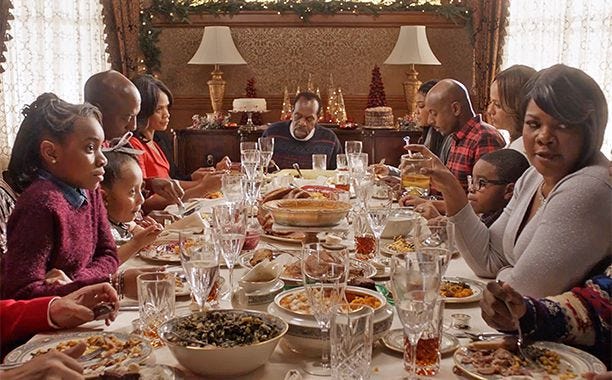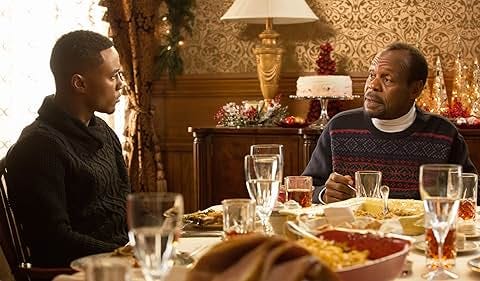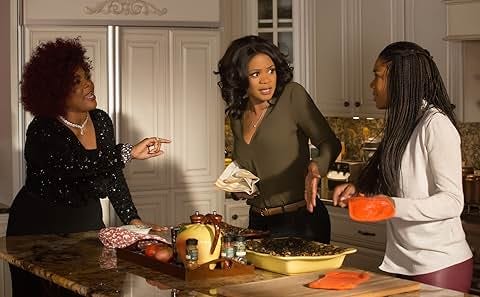The holiday season brings us warmth, joy, and a sense of togetherness that transcends everyday life, and no movie captures this better than Almost Christmas. Directed by David E. Talbert, this 2016 holiday gem features an ensemble cast led by Danny Glover, Gabrielle Union, Mo'Nique, and Kimberly Elise. As we dive into Day 7 of our 25 Days of Christmas series, let’s explore the cultural significance, humor, and heartwarming family dynamics of this film—particularly its celebration of Black culture.
At its core, Almost Christmas is a story about family—flawed, lovable, and complicated. The Meyers family gathers for their first Christmas since the passing of their matriarch, and what ensues is a blend of hilarity, heartfelt moments, and chaos that feels deeply relatable, especially to Black audiences.
One of the film’s most striking cultural elements is its portrayal of holiday traditions in a Black household. From soulful gospel music playing in the background to the boisterous banter and inevitable debates around the dinner table, the film feels like a snapshot of countless family gatherings. It celebrates the beauty of Black family life, where love and laughter exist alongside disagreements and misunderstandings.
The dinner table becomes a focal point in Almost Christmas. Food, in this movie, is more than sustenance; it’s a symbol of connection and legacy. Walter (Danny Glover), the family patriarch, struggles to recreate his late wife’s sweet potato pie—a gesture that underscores the depth of her presence even in her absence. This iconic thread in the movie resonates with many families who understand how recipes and dishes carry memories of loved ones who are no longer with us.
Danny Glover anchors the movie as Walter, the father determined to keep his family together during the holiday season. His performance as a wise yet weary elder who yearns for peace amid familial discord is both touching and nuanced. Walter embodies the quintessential patriarch seen in many Black families—strong, loving, and sometimes overburdened.
Mo'Nique, as Aunt May, is the comedic heartbeat of the movie. Her sharp wit, unfiltered commentary, and larger-than-life personality steal nearly every scene she’s in. Aunt May feels like that one relative we all have—the one who says what everyone else is thinking but is too polite to voice. From roasting her siblings to dishing out advice laced with humor, Mo'Nique brings a vibrancy that elevates the entire film.
Gabrielle Union shines as Rachel, Walter’s youngest daughter, who is navigating single motherhood and unresolved sibling tensions. Her clashes with her sister Cheryl (Kimberly Elise) feel raw and authentic, capturing the complexities of sibling rivalries. Cheryl, the seemingly perfect older sister, embodies the pressure of living up to expectations, a theme many viewers will recognize.
The dinner table is where some of the film’s most iconic moments unfold. In Black culture, the dinner table is a sacred space—not just for eating but for storytelling, laughter, and occasionally airing grievances. In Almost Christmas, it becomes a microcosm of the family’s dynamic, where deep-seated issues bubble to the surface.
One particularly memorable scene involves a heated argument that spirals into chaos. Plates are pushed aside, voices are raised, and yet, through it all, there’s a sense of familiarity. These moments are underscored by a deep love that may not always be expressed in words but is evident in actions. The movie captures how, even when tempers flare, the bond of family remains unbreakable.
One of the film’s greatest strengths is its humor, which is both universal and deeply rooted in Black culture. From Mo'Nique’s hilarious quips to J.B. Smoove’s portrayal of Lonnie, the lovable but cringe-worthy brother-in-law, the comedy feels authentic and effortless.
Aunt May’s comedic monologue about her glamorous past as a backup singer is a standout moment. Her larger-than-life personality and unapologetic confidence bring levity to the film, balancing its more emotional beats. This humor isn’t just about making the audience laugh; it’s a reflection of how Black families often use comedy as a way to cope with life’s challenges and keep spirits high.
The film also excels in its use of physical comedy, particularly in scenes involving Walter’s attempts to recreate his late wife’s sweet potato pie. The sight of Danny Glover struggling with recipes and almost setting the kitchen ablaze is a perfect blend of slapstick and heartfelt homage to tradition.
While Almost Christmas is undeniably funny, it also doesn’t shy away from heavier themes. Walter’s grief over losing his wife looms large, and each family member grapples with their own sense of loss in different ways. This emotional undercurrent adds depth to the film, making it more than just a holiday comedy.
The film handles grief with care, showing how traditions and shared memories can serve as a source of healing. Walter’s quest to perfect the sweet potato pie becomes a metaphor for his attempt to preserve his wife’s legacy and bring his family together.
No Black holiday gathering is complete without music, and Almost Christmas delivers on this front. The film’s soundtrack features a mix of classic Christmas songs and soul-stirring gospel numbers that add to its authenticity. Tracks like “Jingle Bells” by The Commodores and “Ain’t No Woman (Like the One I’ve Got)” by The Four Tops infuse the film with warmth and nostalgia.
The music isn’t just background noise; it’s a vital part of the story, enhancing emotional beats and providing moments of joy and reflection. It reminds us of the role music plays in Black culture, particularly during the holidays, as a bridge between generations and a source of communal joy.
Almost Christmas is more than just a holiday movie; it’s a celebration of Black family life and the traditions that make the season special. It offers a window into the dynamics of a Black household, from the importance of food and music to the humor and resilience that define these families.
By centering the story around a Black family without making their race the focal point of the narrative, the film normalizes Black joy and highlights the universal aspects of family life. At the same time, it honors the unique cultural elements that resonate deeply with Black audiences.
Iconic Moments to Cherish
The Sweet Potato Pie Saga: Walter’s determination to perfect his wife’s pie recipe is both hilarious and heartwarming, serving as a metaphor for the family’s healing process.
Aunt May’s One-Liners: From her tales of rubbing elbows with celebrities to her sassy comebacks, Mo'Nique’s character is unforgettable.
The Football Game: The backyard football scene showcases the family’s competitive spirit and ability to come together, despite their differences.
The Dinner Table Blowout: A quintessential family moment that captures the chaos, humor, and love of holiday gatherings.
As we reflect on Day 7 of our 25 Days of Christmas series, Almost Christmas stands out as a film that brings laughter, love, and a touch of nostalgia to the holiday season. Its celebration of Black culture, family traditions, and the complexities of love make it a must-watch for the holidays.
Whether you’re gathered around the dinner table with loved ones or enjoying a quiet evening by the tree, let this movie remind you of the importance of family and the magic of togetherness. Because, as Almost Christmas so beautifully shows us, the holidays aren’t about perfection—they’re about connection.
25 Days of Christmas: Celebrating Black Holiday Stories
This December, The Blkuem is bringing the holiday magic with a 25-day journey through the most iconic Black Christmas movies of all time. From heartwarming family tales to festive comedies and powerful stories of love and togetherness, we’re spotlighting the films that have shaped how Black stories are told during the season of giving. Join us as we celebrate the joy, resilience, and creativity of Black holiday storytelling—one movie at a time.
A Black Christmas Story: Friday After Next
When we think of Christmas classics, movies like Home Alone, Elf, or A Christmas Story often dominate the conversation. Yet, nestled in the pantheon of unconventional holiday films is a gem that blends comedy, cultural commentary, and an unmistakable vibe that resonates deeply with Black America:

















Such a great series!
Love this movie